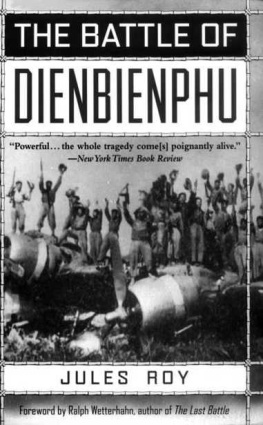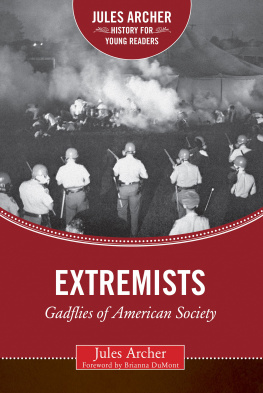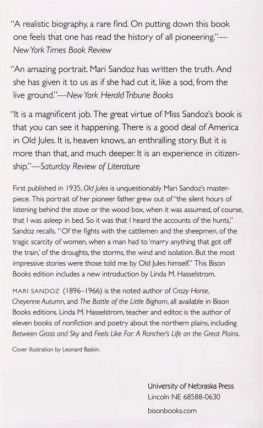Jules Roy - The Battle of Dienbienphu
Here you can read online Jules Roy - The Battle of Dienbienphu full text of the book (entire story) in english for free. Download pdf and epub, get meaning, cover and reviews about this ebook. year: 2002, publisher: Carroll & Graf Publishers/Avalon Publishing Group Inc., genre: History. Description of the work, (preface) as well as reviews are available. Best literature library LitArk.com created for fans of good reading and offers a wide selection of genres:
Romance novel
Science fiction
Adventure
Detective
Science
History
Home and family
Prose
Art
Politics
Computer
Non-fiction
Religion
Business
Children
Humor
Choose a favorite category and find really read worthwhile books. Enjoy immersion in the world of imagination, feel the emotions of the characters or learn something new for yourself, make an fascinating discovery.
- Book:The Battle of Dienbienphu
- Author:
- Publisher:Carroll & Graf Publishers/Avalon Publishing Group Inc.
- Genre:
- Year:2002
- Rating:5 / 5
- Favourites:Add to favourites
- Your mark:
- 100
- 1
- 2
- 3
- 4
- 5
The Battle of Dienbienphu: summary, description and annotation
We offer to read an annotation, description, summary or preface (depends on what the author of the book "The Battle of Dienbienphu" wrote himself). If you haven't found the necessary information about the book — write in the comments, we will try to find it.
The Battle of Dienbienphu — read online for free the complete book (whole text) full work
Below is the text of the book, divided by pages. System saving the place of the last page read, allows you to conveniently read the book "The Battle of Dienbienphu" online for free, without having to search again every time where you left off. Put a bookmark, and you can go to the page where you finished reading at any time.
Font size:
Interval:
Bookmark:

BY THE SAME AUTHOR
The War in Algeria
The Unfaithful Wife
The Navigator

THE BATTLE OF DIENBIENPHU.
By Jules Roy. Translated by Robert Baldick from the French, "La Bataille de Dien Bien Phu." Introduction by Neil Sheehan.
By ROBERT SHAPLEN
 HE American role in Vietnam, so precarious and confused today, has never been clear and calculated like that of the French, which ended with the fall of the northwest valley "fortress" of Dienbienphu in May, 1954, and the agreements signed at the Geneva Conference in July of that tortuous and fateful year. It is sometimes said that we "inherited" the position of the French in what became South Vietnam, and that as a result of the failure of the American-supported South Vietnamese troops to hold back the Vietcong (Communist) forces we are now faced with a similar moral and military defeat in Southeast Asia. These are simplifications, though there are certain obvious comparisons with the past.
HE American role in Vietnam, so precarious and confused today, has never been clear and calculated like that of the French, which ended with the fall of the northwest valley "fortress" of Dienbienphu in May, 1954, and the agreements signed at the Geneva Conference in July of that tortuous and fateful year. It is sometimes said that we "inherited" the position of the French in what became South Vietnam, and that as a result of the failure of the American-supported South Vietnamese troops to hold back the Vietcong (Communist) forces we are now faced with a similar moral and military defeat in Southeast Asia. These are simplifications, though there are certain obvious comparisons with the past.
It is true that there has been a continued demonstration of the inability of Western-oriented and Western-trained Asian troops not fervidly committed to a cause to fight against a dedicated and often fanatic anti-Western native guerrilla army. It is also true that, like the French before them, the Americans often refused to face military facts and
have indulged in some remarkable selfdelusion and over-optimism. The present difficult situation in Vietnam, however, insofar as it concerns the peculiar adjunctive role of the United States and its failures of omission and commission, has more dissimilarities than similarities to the predicament of the French in the early fifties, the tragic climax of which in the awesome, bloody battle of Dienbienphu is described in this moving and dramatic book by Jules Roy, the distinguished French novelist and journalist.
Mr. Roy, an Algerian by birth, was himself a French Army officer in Indochina. He resigned his commission in 1953 because he felt he was engaged in "an unjust cause ... against a whole people which spurned us because we had robbed it of its land and its sovereignty." Four years ago, he writes, when moved by a desire to re-examine the ambiguities of that unjustified cause and to study "the corruption of conscience, the misuse of whatever French chivalry still remained... the drama took me once again by the throat."
He thereupon set out on an exhaustive examination, based largely on interviews with participants, reading of documents and a visit to the scene of the battle, of what happened day-byday at Dienbienphu, of the military mistakes that were made and should have been avoided, and of the political and emotional factors behind them that all added up to "one of the biggest strategic blunders in history." His book is the story of his findings and his conclusions.
Mr. Roy writes that even before Dienbienphu "our ardent militarists ought to have brought to an end by negotiation this war which it was impossible to win." Though it is unlikely that, militarily, the United States and the South Vietnamese will face another Dienbienphu on such a large scalethere could be a series of smaller ones-one tends to relate what the author says about the French situation in the fifties to the growing campaign for negotiation today in a situation where many observers hold that it is equally impossible for us to "win." It is here, however, that the careful reader of this book, which is full of righteous and justified anger against those who allowed the Indochina war to go on so long, should make the proper distinctions and ask himself the important questions-are the circumstances such today that it really is impossible to win, and in what various ways is this war different from the Indochina war?
In paying tribute to the courage avid martyrdom of individual French officers, whose junior ranks were so decimated by the nine-year war, Roy declares that their tragedy lay in their blind service to "the most stupid imperialism in the world, which disguised its refusal to lose its dividends and its markets as a crusade against Communism." That the American effort to support South Vietnam, now in its 11th year, is patently not a defense of colonialism or imperialism, despite what the Peking, Hanoi and Moscow radios say, should by now need no further elaboration.
What we did, unfortunately, inherit was an overlay of French colonialism. This colonialism had left a sad mark on a resourceful people whose nationalist spirit had for decades been trampled by the French. It was a spirit only brought back to life in the north in 1945-46 by the Vietminh (precursors of the Vietcong), under the imaginative leadership of Ho Chi Minh, that fascinating Communist-nationalist many Frenchmen and Americans believe might have been genuinely "pre-Titofied" if a real effort had been made.
When the French, after first recognizing Ho's regime in the north, set up their own government in the south and went to war against Ho in the fall of 1946, the Americans supported them but failed at the same time to push them hard enough into granting real independence to the southern Vietnamese government. After 1954, when the French were gone, we backed President Ngo Dinh Diem; and when his South Vietnamese regime, successful at first against heavy odds, veered to nepotism and dictatorship, we did not discourage its overthrow.
Since then, as sadly evidenced by the series of coups and counter-coups that have occurred, neither we nor the South Vietnamese leaders have shown any indication that we were jointly prepared for the anarchic consequences of Diem's inevitable fall. But, on the basis of what the author tells us of the French dilemma before and during the Dienbienphu campaign, he would probably be the first to admit that the anomalous American position has all along been different, both militarily and politically.
Unlike the French officers who completely directed and also fought the earlier war, American "military advisors" in South Vietnam-some 25,000-are caught in a quandary. They have no force of decision, and in seeking to assist the Vietnamese they cannot order but only suggest. As a result, they have been almost totally unable to get the Vietnamese to fight the kind of war they feel is required-more mobility, night patrol, counter-ambushes, etc. Our diplomats have proved equally unable to give the Vietnamese much useful political guidance, but our failure here has been one of method and tactics rather than (unlike the French) of a lack of desire to develop new political forms.
Even so, and despite many additional bureaucratic handicaps and aggravations, some of them inherited from the French and some of our own making, our military men, and several hundred rural-reform workers in particular, have achieved some commendable results. Unfortunately, these have not been sufficient to turn the tide, and now we have engaged ourselves more directly in the conflict by bombing North Vietnam. Nevertheless, up to now, this has not been "our" war in anywhere near the French sense.
 iTH these differences in mind, it is useful to study the French tragedy as Roy portrays it, compounded as it was of so many complicated elements no longer present-among them deeply injured French national pride, the private ambitions and jealousies of the leading participants, as well as colonial stubbornness and greed. The author manages to interrelate all these factors subtly and effectively.
iTH these differences in mind, it is useful to study the French tragedy as Roy portrays it, compounded as it was of so many complicated elements no longer present-among them deeply injured French national pride, the private ambitions and jealousies of the leading participants, as well as colonial stubbornness and greed. The author manages to interrelate all these factors subtly and effectively.
Font size:
Interval:
Bookmark:
Similar books «The Battle of Dienbienphu»
Look at similar books to The Battle of Dienbienphu. We have selected literature similar in name and meaning in the hope of providing readers with more options to find new, interesting, not yet read works.
Discussion, reviews of the book The Battle of Dienbienphu and just readers' own opinions. Leave your comments, write what you think about the work, its meaning or the main characters. Specify what exactly you liked and what you didn't like, and why you think so.













